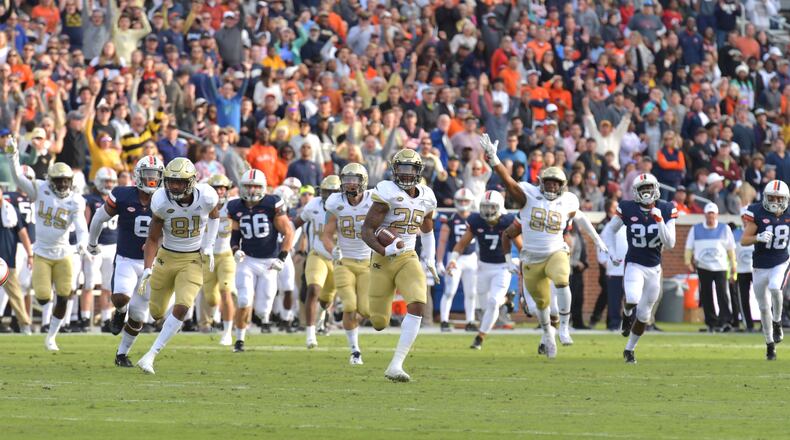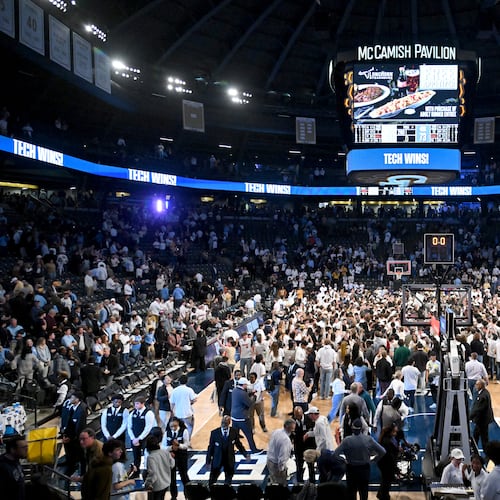The practice period opens with an announcement over the speaker system in the Georgia Tech indoor practice facility – “Thursday Races! Thursday Races!” – and the opening strains of Kenny Loggins’ “Danger Zone.”
Ten cones are set up across the indoor practice field along the 30-yard line. Players shout above the din, taking their places along the sidelines, others at the cones. It’s time to find out who the fastest Yellow Jackets player is, a race in the form of a kickoff drill.
Ten of the Tech’s fastest players take their places. Coaches pick winners, some flashing fake dollar bills behind their favorites. At the kick, the players sprint downfield, their speed measured by GPS devices underneath their shoulder pads.
“Winner, heat 1, Tariq Carpenter – 22.97 miles per hour,” comes the announcement over the speaker system.
Time will tell if Tech’s special-teams play will improve with coach Geoff Collins in charge, but the process looks like it’ll be entertaining.
“Everybody says they’re faster,” safety Christian Campbell said of the appeal of Thursday Races. “I’m faster than him, he’s faster than me, but Thursday Races, you really get to prove it. It’s really fun.”
Players believe that the priority that Collins has placed on the special-teams units, with Thursday Races being only a small part, will be difference making.
“There’s been a big emphasis put on special teams, and coach Collins preaches that, if you don’t play on special teams, you don’t play,” Campbell said. “I wouldn’t say it’s an incentive, but it kind of is.”
That approach – players needing to prove themselves on special teams first if they want to play offense or defense – has caught notice.
“If you have to go all out on special teams just to get on offense or defense, it boosts your motivation to want to get on special teams,” cornerback Jaytlin Askew said. “Not a lot of people want to get on special teams, but if you have to get on special teams just to play, everybody’s going to want to play.”
Expect Tech’s special-teams units to be loaded with starters and other key contributors. Wide receiver Jalen Camp, for instance, said he is on the punt, kickoff, kickoff-return and hands-team units.
As is his wont, Collins has found different ways to get the message across. For instance, team members said, the punt team gets to eat first at team meals. Collins said he has put focus on special teams not only because it can play such a decisive role in the outcome of games, but also to help prepare players for the NFL.
“It’s important to me to make sure that emphasis is placed here so that when they get that opportunity, they’re ready for that time,” he said.
Previously, it wasn’t as though coach Paul Johnson didn’t give special teams time or attention. He tried two different coaches solely for special teams. After that experiment, when the kicking game was below standards, he swapped the units that different assistants were assigned to coach.
Results weren’t all disastrous. Tech has had a strong punt unit for the past two seasons with punter Pressley Harvin. Former kicker Harrison Butker’s booming kicks made the kickoff team a strength during his career. Juanyeh Thomas returned a kickoff and a free kick after a safety for touchdowns last season. But overall, it was not a strength.
Tight end Tyler Cooksey said that it seemed to him that not many players wanted to make special teams their top priority.
“I would always just try to yell and scream and try to get people to just get pumped up for a kickoff or a kick return, and everyone’s just kind of moping out there,” Cooksey said. “Even whoever was coaching it was kind of moping out there. Now it’s like every single coach on the field is paying attention and is coaching a specific role out there on the field, and I think that’s unbelievable and is a very valuable part of this team.”
Campbell, who will play on multiple special-teams units, said that there is a heightened attention to detail. At a special-teams meeting led by cornerbacks coach Jeff Popovich, Collins offered his input as Popovich showed a clip from practice of the kickoff team running to the 35-yard line as the kickoff was made. Collins stressed that every player needed to be hitting the line right as the kick was struck in order to get downfield as quickly as possible. Campbell said that the same coaching point had been made previously, but perhaps not with the same stress.
“(Collins) treats all the special-teams practices as if it was a live game,” Campbell said. “If you mess something up, it’s not, ‘All right, we’ll just do it again.’ You mess it up, it’s like, you’re out. Like, you just cost us. He treats it with urgency.”
There is plenty to recommend special-teams play at Temple in Collins’ two years there. Most notably, the Owls blocked five kicks in 2018, tied for fifth nationally, and scored eight touchdowns via special teams. Temple led the American Athletic Conference in return yardage on both kick and punt returns. Special-teams fakes also were a forte.
However, the Owls also ranked 106th nationally in punt net (35.6 yards per punt). They also allowed six kickoff returns of 30 yards or more, tied for 101st nationally. In 2017, Temple had eight kicks and punts blocked, though the number dropped to two in 2018.
Collins inherits an All-ACC punter in Harvin, who has increased his power after a summer of workouts designed for specialists. Kicker Wesley Wells, who did not miss a field-goal or extra-point attempt last season, has been challenged by Brenton King. Harvin aims to have the punt team lead the country in net punting.
“Because with my body and how I can hit a ball now with that type of speed (among the coverage unit) – 22, 23 miles an hour running down the field to ’em – they’ve got no chance,” Harvin said. “No chance. Just got to put it in there every rep.”
For Tech to be the sort of football giant that Collins envisions, special teams will undoubtedly need to be part of the equation. For this year, and more broadly as he sets a foundation for seasons to come, the race is on.
About the Author
Keep Reading
The Latest
Featured



